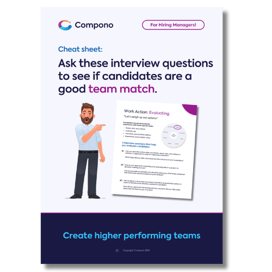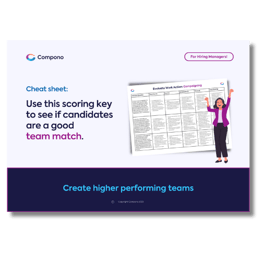25 Good Interview Questions to Ask for Effective Hiring
The article "25 Good Interview Questions to Ask for Effective Hiring" stresses the importance of strategic interview questions in identifying top...
Hire
|
Engage
|
Develop
|
Assure
|
|
Automatically match to candidates who are a great fit for your team culture and who are intrinsically motivated to succeed. |
Deeply understand your organisation with science-backed analytics on your culture, team design, and engagement. |
Back your onboarding, compliance and skill development with industry-leading credentialling, competency and capability expertise.
|
Reimagine skills assessment and certification with dedicated tools designed to elevate your competency frameworks.
|
.png?width=383&height=200&name=team%20(1).png)
1 min read
 Compono
Nov 16, 2023 9:24:26 AM
Compono
Nov 16, 2023 9:24:26 AM

Without a clear understanding of who we are, we simply don't have clarity of who we need.
If you missed our article on the 8 work actions needed for high-performing teams, you can revisit it here.
There, we provided a Cheat Sheet to help you map the priorities, strengths, and blind spots of your existing team. This critical step helps you identify the most important work action your team needs for a new hire to be successful.
Once you’ve identified the type of work your team needs most, use this information as a hiring benchmark.
You can do this in the following ways:
During interviews, ask candidates about past experiences that reflect the desired behaviours.
Look for evidence that they exhibit the behaviours that contribute positively to your team dynamics.
Present candidates with hypothetical scenarios related to your team. Ask how they would respond or act in those situations. This helps you gauge their potential fit.
Reach out to candidates' references and inquire about their past behaviours in team settings.
Consider using behavioural assessments or personality tests to further evaluate candidates. These assessments can provide additional insights into a candidate's natural tendencies.
We have compiled a list of specific interview questions you can use, right now.
These questions are based on the 8 work actions that define high-performing teams and will help you assess how well a candidate can do the tasks the team requires.

Interview questions will provide structure, but you still need to evaluate the responses to each unique question. To help, we have assembled a scoring key for you to fairly and objectively evaluate responses to each question.
Each work action has a unique scoring key. You can use the relevant table to score how well candidates respond to the interview questions.


The article "25 Good Interview Questions to Ask for Effective Hiring" stresses the importance of strategic interview questions in identifying top...

Overview The article focuses on best practices for HR managers in formulating effective interview questions to enhance the recruitment process. It...

The article provides an overview of effective hiring practices by presenting sample interview questions and responses that enhance the recruitment...

The article emphasizes best practices for crafting effective interview questions, highlighting their critical role in assessing candidates'...

Overview The article examines how to effectively respond to the top 10 interview questions to improve a candidate's chances of success. It...

Effective interview questions are essential for evaluating candidates' qualifications, thought processes, and cultural fit. By focusing on...